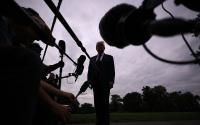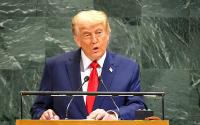29 October 2004The Daily Texan
Naomi Klein, author and syndicated columnist for The Nation and The Guardian in London, took time between deadlines last Sunday morning to speak with the Texan about her upcoming lecture in Austin. She will be on campus on Oct. 31 at 2 p.m. in the LBJ auditorium speaking mostly about an issue highlighted in her most recent report in the September issue of Harper's, the economic "shock therapy" being applied to Iraq.Like most of her recent work, her focus throughout the interview affixed on the situation in Iraq, citing some of her travels to fledgling democracies in the south as guides to understanding the democracy being born in Iraq.Your latest piece reported on the $195 million Iraq dolled out on Oct. 21, reparations from Saddam Hussein's 1991 invasion of Kuwait still being paid off. Where does a story like that even begin, and how do you get the sources straight?Well, I think for most journalism, one story leads into another, and in this case, I'll just go back three chains. I wrote a major piece for the September issue of Harper's based on a trip I made to Iraq to research the economic front of the war. There aren't that many people who are writing about the economic front of the war - you hear about the corruption stories with Halliburton and things like that, but in terms of how Iraq is being restructured, it's something that's really hard to focus on when there's still a war going on, but it's happening anyway.So I wrote that story, and because of that story, shortly after it was published, I got a phone call from someone who wanted to give me some confidential papers about a deal that had been proposed. The papers were the deal: 75 pages of documents marked privileged and confidential from a consortium of companies including the Carlyle Group and the Albright Group that were submitted to the government of Kuwait.One of the things that was most interesting about those papers was that James Baker is part of the Carlyle Group, and James Baker is President Bush's envoy on Iraq's debt, and this proposal was to help Kuwait make sure it was paid its debt from Iraq. So you have a direct conflict of interest, where you have a government employee, James Baker, whose job it is to convince the world to forgive Iraq's debt in the interest of Iraq and in the interest of U.S. taxpayers, who are paying for much of Iraq's reconstruction. And then you have James Baker the private businessman, who is part of a consortium that's offering its services to one of the governments that is a major debt holder.So it was an astonishing conflict of interest story, but as I was researching it, I learned a lot about Iraq's debts that I didn't know and that wasn't being reported. One of the areas I learned a lot about was the fact that Iraq was still paying reparations to Kuwait even as it was under foreign occupation and even after Saddam had been overthrown.I was totally shocked because it hadn't been covered, that American companies were getting - not only were [Iraqis] paying these huge sums out, but they weren't going to needy Kuwaitis who had lost loved ones or limbs in the war. When we hear about war reparations, you usually think that it's compensation for injury and for human loss and suffering, but it turned out that the whole reparations process was very controversial, although not covered at all. It's covered more in the Arab press than it is in the North American press, so I just started searching on it, and it's kind of a chain of events that leads to a story like that.Where do you find the best news information out of Iraq?First of all, like any story you have, you need to go through a really rigorous process of fact-checking. All of the information in that article [on reparations] I confirmed directly with the sources involved. All of the statistics come from the United Nations compensation commission - they're hard to figure out and nobody had really gone through their website because it's really not user-friendly at all, everything's in these huge PDF files, so you can't search on something. You have to open up each PDF and you have to print it out and you have to read it, and I had a research assistant help me with that.For young journalists today, the Internet is both a wonderful tool and it's also a curse, because I think information comes more easily to young people today than it ever has before. It's so instantaneous: You type something into Google and you get what you get. You get information that for me, when I started out in journalism - and I'm not that old, I'm 34 - I had to go to a library and I had to go through a really tedious process of index cards and microfiche just to find a newspaper article that you can now find so easily through a database search.You're able to do investigative research with a great deal of ease, but I think that that ease is also a bit of a trick, because if you don't find it easily, the assumption is that it's not there. People do their Google search and if they don't turn anything up, they assume there's nothing there, and there still is some fairly tedious research to do.Honestly, when information is really explosive, people make some effort to hide it. Even if they are part of public institutions and they have to put it online, it won't be easily searchable, or else it will still simply be secret and you still need the cloak and dagger manilla envelope, which happens very rarely.In terms of finding the information, as a consumer of news, I think there still is a great deal of fact-checking that needs to happen. I do my news rounds on the Internet: I read the Guardian in addition to reading the New York Times and more mainstream newspapers. I watch Democracy Now! online every day, and I find their headlines particularly useful on Iraq because they have their own process of having a very wide range of sources and then they boil it down - their sources are not just American, they also read the Arab press, which makes a big difference.What do you see as the dynamics of Nov. 2?I think it is important that Bush is defeated; I'm not a big Kerry fan, in fact I'm not a Kerry fan. That said, I'm not somebody who believes it doesn't matter. I think it matters in several different ways.I think the most significant way that it matters is that I think the Bush administration has combined with a mainstream electronic media in the U.S., particularly television, and has projected to the world an image of the United States that isn't true, which is a very vengeful country ignorant of customs and intolerant of difference.I think it's not only is it not true, but I think it's really dangerous for Americans to be seen as homogenous, because I think more than anything else, that breeds anti-Americanism, which we know is on the rise.I think that if the American electorate votes for Bush again, the message that will be sent to the world is a dangerous one - that message is we're happy with the way things are going, we like this administration, we like the choices they've made - and that message of approval, I believe, will backfire on Americans and will harden people's views and hatreds in various ways.That said, I think that people around the world also recognize that John Kerry is not running on an anti-war platform, that he is actually promising much of the same in Iraq, and so an election of Kerry will not be seen as an anti-war vote, but it will be seen as a message of dissatisfaction with the status quo. And I think that message of dissatisfaction is a really important one to send, and it's an important place to start recovering from much of the damage that has been done by this extraordinarily ideological and vengeful administration.So I think it matters, and I think it also matters because it will be tremendously demoralizing for a lot of people in the U.S. and outside of the U.S. if Kerry loses. That's because, for better or for worse, the entire resources of progressives, with very few exceptions, have been poured into this election campaign.I have some ambivalence about that: I think too much focus has been just on anyone but Bush rather than on the issues themselves. I don't think that's strategically smart in terms of defeating Bush; if there had been more of a continued focus on what is actually going on in Iraq now instead of being part of the horse race of electoral politics - groups like MoveOn and even publications like The Nation have been part of this logic.I don't think it actually helps to defeat Bush. I think the best way to defeat Bush is to focus on the actual failings at home and in Iraq. That said, this decision was made. I was at a conference exactly a year ago of all the major foundations that fund progressive groups in the States - the Ford Foundation, the Carter Foundation - I was invited to speak. There were billions and billions of dollars of funding in that room, and they were absolutely open about the fact that their entire funding priorities for the next year was going to be to defeat Bush, and that's it - not the issues, but defeat Bush. That decision was made by powerful people with money, and given that, people have poured their hearts and souls into that goal. If it is not achieved, it will be tremendously demoralizing, and I'm worried about that. So that's another reason why it matters.During the Bush administration, we've seen some of the largest global days of protest. What ways would John Kerry affect these movements, and what ways would these movements affect John Kerry?Most of the demonstrations have just been anti-Bush, and I think that social movements have really been dumbed down under the Bush administration.I believe that before Bush was elected, we were at a really interesting moment politically, where you started to see a lot of real, mass social movements emerging that weren't focused far-left on vilifying individual politicians or even individual political parties, and were looking at systems of trade, multilateral institutions and were really starting to engage with policy in thinking about how to build a more just economy and society. I'm referring to the movements against corporate power and so-called globalization.Once Bush was elected, and particularly after Sept. 11 when the ideologues really took the reigns in his administration, the politics have been very personality focused - "Get Bush out, we hate Bush" - against the Bush agenda. We have really stopped engaging very seriously with policy and demands and I think it's been a real failure of the U.S. peace movement and even the global anti-war movement that we aren't now talking now very seriously about what an alternative policy would look like with relation to Iraq and being real credible voices in that arena.We're in this totally caricatured, personality-based politics of just no to Bush, no to the Bush agenda, no to war - just slogans. I think that if Kerry were elected, the protests would not be anti-Kerry protests, they would begin to be protests against the bombing of civilians in Iraq, they would begin to be protests demanding reparations for the people of Iraq, demanding genuine elections in Iraq - we would start to engage with reality again.This is something that I've tried to explain and write about that I feel is wrong with the way we're talking about the war in Iraq, which is that we don't actually talk very much about what is going on there right now - the massive war crimes every day - and we're meeting it with just slogans of "No to war," "Yes to peace," "No to the Bush agenda" - "Vote Kerry." It's extraordinarily simple-minded, and it's essentially advertising, it's not real politics.That is what I would hope would change with Kerry in power, and I think it would have an effect because people would see alternatives and would rally behind those alternatives and [they] would gain momentum and hopefully space in the political discussion and could lead to real change in a way that the sloganeering right now and the personal vilifying can't.So I'm not saying that Kerry will listen to us because he's a nice guy: I don't believe that, and I'm much more concerned that Kerry will play to the right as he has consistently in this campaign. My concern is that on Nov. 3, if Kerry is elected, he will prove what a tough guy he is - in the same way that he's proving what a tough guy he is by dressing up in hunting outfits and talking about how he's going to hunt down and kill the terrorists - by carpet-bombing Fallujah and showing that there's a tough guy in town.Frankly, I think that we're going to be facing that with Bush or Kerry. I think that as gruesome as what's going on in Iraq right now, we're actually seeing their version of restraint - there are a lot of people who want to inflict even more indiscriminate violence in civilian areas, and are very pleased that the non-embedded media has essentially been driven out, and al Jazeera has been so vilified, that we're not seeing the images of the civilians who are on the other end of those bombs in Sadr City and Fallujah.When I was there, I did see it, and it really haunts me. I was in the hospitals the day after the bombs dropped and I know it's kids and mothers who are being slaughtered, and it's so sanitized. I think we are seeing their version of restraint - from the Republican perspective that's because there's an election campaign and they know it could backfire - so they haven't fully retaken Fallujah, and we know what it means for them to retake Fallujah - it's a massive bombing campaign.As soon as Nov. 3 rolls around, if there is a Bush administration in power, all that restraint will be gone and they'll use the January elections as their rationale for committing war crimes. It is a war crime to inflict collective punishment on a civilian population, which is what we're talking about.If Kerry is in power, there will be another dynamic at play, which will be that all these guys that have been voted out will suddenly be full-time pundits again on FOX and they'll retake their posts at the American Enterprise Institute, and they will goad him into this.You've been at the front of the debate on globalization: do you see Iraq as the place where this debate is heading?I think the economic project, which is called globalization - but it really isn't globalization, it's fundamentalist, free-market policies that are being imposed globally which are being called globalization (it's not the globalness that's the problem, it's the policies that are the problem). [These policies] are being universally imposed, and most of the research that I had been doing before the war was focused on how they were being imposed by institutions like the International Monetary Fund and the World Trade Organization.The truth is that these institutions have never been able to impose these policies alone in poor countries - the policies I'm referring to are attacks on trade unions, mass privatizations of the state, massive layoffs in the state sector, massive cuts to the social safety net - these radical transformations, which are sometimes called "shock therapy"; the ground is always prepared for these policies with some form of massive upheaval.I was actually in Argentina when the war in Iraq started making a documentary, and it was a really good place to watch the war from, if you'll pardon the phrase, but I think we all watched the war.I watched the war from Patagonia in Argentina because I was making this documentary, and that's where I was the day the invasion began. I was in a city called Neuquén, which is a very oil rich part of Argentina, and it's also a part of Argentina with a really powerful revolutionary history.Everybody who I talked to there when the war started said, "They did this to us, this happened to us too." And what they were referring to was not what the IMF had done to them in the 90's, but the military coup in the 70's, when you had a Kissenger-supported coup d'état come to power and disappear 30,000 people whose crime was being leftist union organizers.They were in power until 1983 and terrorized the population, and so that when democracy finally came to Argentina, people were so insular and so afraid to even engage politically - they stayed in their houses and were extremely individualistic - then they were able to continue the project without violence, or without that overt violence, but it was started with violence, and the IMF just kind of finished the job once the population was primed for that.I think it's really important to understand these economic policies as violence, and that they actually cannot be imposed without some form of terror, without some form of violence. We've seen this throughout Latin America, and we've seen it in Africa, and I think what has happened in Iraq is the culmination of the economic and the military side of this single project.What is so dramatic and important to understand about what has happened in Iraq is the ambition and the speed with which it was carried out. In Argentina, it took three decades to do what they did in six months in Iraq. The violence was far more dramatic - they called it "shock and awe" - and the speed with which they imposed the economic reform, which is also what I'm going to be talking about when I'm in Austin, was immediate. It was the first thing Paul Bremer did when he came to power.It's the same project, but with more firepower, with greater speed - the whole thing is in fast-forward, the whole thing is on steroids. There's a way in which I think it's really important to look at it because it's so shameless, it's so unmasked. There's a way that truly understanding what's happening in Iraq helps us to understand what's happening in the world, and even the entire project we see in a much less violent form in North America. We see it in a devastating form in most southern parts of the world, but yet drawn out over decades.How do you see the system getting reformed?I think it's an important question, and it's a question that we really need to struggle with. That's why I guess I'm becoming more outspoken in my criticisms of the way we are doing politics because I don't think that the slogans are enough.The year before the war I spent time in Argentina and also in South Africa, and I was really affected by the research I did in these two countries because they were both countries that had suffered so greatly like so many parts of our world under deeply oppressive regimes.The reason why I focused on these two countries was because both of them were the economic leaders in their respective continents: they had the largest middle classes, they were the most developed. And yet, what is going on in both of those countries, rather than development, [is that] they're actually deindustrializing - losing jobs, people are becoming poorer.What interested me most was the betrayal that both countries had experienced in the transition from dictatorship to democracy or apartheid to democracy. The research I did there was about how it happened that you had these countries that had suffered so much under oppressive regimes and had finally won, finally gotten what so many people had died and fought for which was democracy.Yet, despite the incredible sacrifice in both of these countries, you had poverty deepening under democracy, you had the same economic policies introduced under apartheid and dictatorship continuing under democracy even though everyone was elected on promises that they were going to have wealth redistribution, that there was going to be economic democracy as well as just the right to vote.I just became really interested in what happens in those transitions from repression to democracy - what deals are made in those few months where they say you can have the vote but you're going to have to have the same economic minister as before and the head of the central bank is going to stay the same, and you have to inherit the debts of the people who oppressed you and you have to keep paying them and your going to stay in this spiral.I became interested in how these incredibly brave struggles for liberation are betrayed in these moments of transition, and what I started to see in Iraq was that it was happening - it was happening all over again. You had this country that was invaded in the name of freedom and liberation, but yet as people were still suffering with the lights still out and the water still off, they were making the deals.I started reading about them in the newspaper, that Iraq was going to join the WTO, that they're going to get a loan from the IMF - all of these new economic laws were being written without their consent.I just thought that we're not going to read about this after the fact, which is what I had been doing in Argentina and South Africa - reading about it after it already happened and talking to people after was already too late. It's happening right now, and it's our governments who are doing it.Our governments invaded their country in the name of democracy, and here they have been steadily eroding that possibility since the occupation began. In terms of what we can do, there are some really concrete things we can do - which is we can stop them. If we actually learn about this and engage with policy, we can insist that Iraqis not inherit the debts of their dictator, we can insist that they not be shackled by IMF conditions on loans, and this is how democracy is eroded and undermined.What we can do is we can save the space so that when democracy does come to that country, it's meaningful - all the decisions haven't already been made by their occupiers, by their dictator. There is still space left for meaningful decision-making, and we clear that space by preventing these powers that are steadily trying to shackle that democracy with IMF conditions and debts and laws that they didn't write and weren't consulted on, with 40-year contracts for privatized utilities.It doesn't sound all that sexy, but this is actually how democracy is turned into a ritual instead of a live, meaningful forum for people to be the architects of their destiny. To me, the job of the people who opposed this war now is to save that space, to figure out how to save that space and make concrete demands on our politicians who are the ones that are doing this, and not say "we know how Iraq should be governed" but say "we know what the preconditions are for genuine democracy, and we insist that the democracy that comes to Iraq be genuine democracy."






